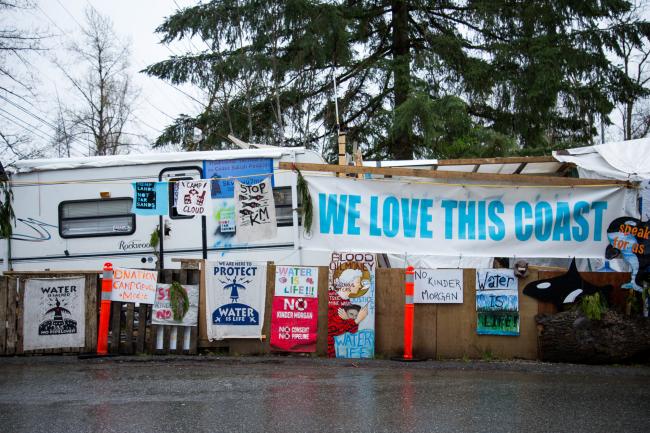 © Bloomberg. Protest signs are displayed outside of the Kinder Morgan Inc. facility in Burnaby, British Columbia, Canada, on , April 11.
© Bloomberg. Protest signs are displayed outside of the Kinder Morgan Inc. facility in Burnaby, British Columbia, Canada, on , April 11.(Bloomberg) — British Columbia Premier John Horgan, who has vowed to use every possible means to thwart a Kinder Morgan Inc (NYSE:). pipeline expansion, was told by legal advisers last year before taking power that blocking the project would be against the law.
That hasn’t stopped the 58-year-old former pulp mill worker from digging in his heels to stop the C$7.4 billion ($5.9 billion) Trans Mountain expansion project, sparking a national uproar and drawing sharp rebukes from his counterparts in oil-rich Alberta and the federal government .
Houston-based Kinder Morgan threatened over the weekend to walk away from the project that was approved by Prime Minister Justin Trudeau in 2016. That prospect has catapulted the contentious expansion into a symbol of fragile national unity as critics call B.C.’s obstruction of a federally sanctioned project an assault on Canada’s political system and the rule of law.
“Failure is not an option,” Canadian Finance Minister Bill Morneau said in Toronto Thursday, saying the federal government is in talks with Kinder Morgan about using the tools at its disposal to ensure the project is built.
Stopping Project “Unlawful”
Horgan’s Environment Minister George Heyman said in a debate in the provincial legislature this week that during the transition of power before the new government took office in July, “it became clear, through listening to legal advice, that we did not have the authority to stop a project that had been approved by the federal government within its jurisdiction.”
Horgan told Heyman that “stopping the project was beyond the jurisdiction of B.C., and to talk about it or frame our actions around doing that, as opposed to defending B.C.’s coast through a variety of measures that were within our jurisdiction, would be inappropriate and unlawful,” Heyman said.
That’s given Horgan little pause. While he’s dropped references to outright stopping the project, his intention remains explicit. His government proposed in January to restrict any increase in bitumen shipments, concerned about possible oil spills along the Pacific coast. Earlier, he hired a former Supreme Court judge to advise his government on how it could intervene in a legal challenge to the project, even though pipeline approval falls squarely in the jurisdiction of the federal government.
“The interests of Texas boardrooms are not the interests of British Columbians,” Horgan said after Kinder Morgan announced its decision Sunday to stop all non-essential spending on the project.
Wild West Politics
Canada’s Pacific Coast province has long had a reputation as a political Wild West where anything goes. Horgan’s predecessor, Christy Clark, attended private, cash-for-access fundraisers where donors paid as much as C$10,000 a seat. Until December, political parties could accept virtually unlimited donations from unions, businesses and foreign entities — including Kinder Morgan, which contributed at least C$33,000 to Clark’s Liberal Party, according to one tally of donor records. Clark reversed position to support Trans Mountain before being ousted from office last year.
Horgan, who pledged to clean up B.C. politics, has yet to publicly acknowledge that one of his central campaign pledges is legally untenable. Horgan’s office didn’t immediately respond to questions seeking comment.
His New Democratic Party’s election platform committed to “use every tool in our toolbox to stop the project from going ahead.” His government is propped up by the Green Party, and one of the alliance’s central tenets is to stop the expansion of the Kinder Morgan pipeline.
Horgan told the legislature this week that he stands by his campaign pledges: “We’re living up to those commitments by using the courts to make our argument that we believe that the risks are too great to proceed with this project.”
Trans Mountain or No, Alberta Has Some Oil Shipping Options
The Trans Mountain expansion would move an additional 590,000 barrels a day of crude from Alberta’s oil sands to a terminal near Vancouver. The project would allow Canada to export crude to new markets in Asia and reduce its over-reliance on the U.S. The looming pipeline bottleneck has contributed to a discount in Canadian crude prices relative to U.S. benchmarks.
Kinder Morgan plans to walk away unless obstacles to the project can by resolved by May 31. In announcing the ultimatum on Sunday, it pointed the finger at Horgan.
“Since the change in government in June 2017, that government has been clear and public in its intention to use ’every tool in the toolbox’ to stop the project,” the company said in a statement. “The project is now facing unquantifiable risk.”
The issue threatens to escalate into a domestic trade war. After Horgan’s government proposed the bitumen restrictions in January, Alberta hit back with a short-lived ban on B.C. wine imports. Alberta Premier Rachel Notley has threatened to cut off oil exports to B.C. and has also asked the federal government to withhold funding from the neighboring province. Both Alberta and the federal government are considering buying stakes in the project to push it forward.
Trudeau will interrupt an international trip, returning to Ottawa on Sunday to hold a meeting on the pipeline with Horgan and Notley, his office announced Thursday.
Horgan’s reaction to the growing uproar has, meanwhile, been glib.
“I’m surprised that a press release from Texas could evoke such consternation across the country,” he told reporters in Victoria Tuesday. “I believe the Texas-based company is deliberately trying to dial up crisis within our Canadian federation.”
Source: Investing.com




























